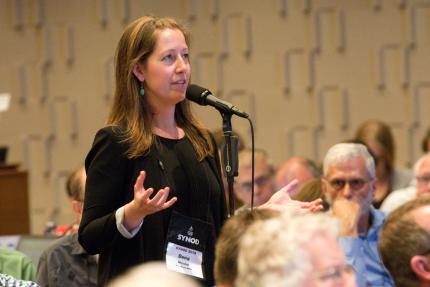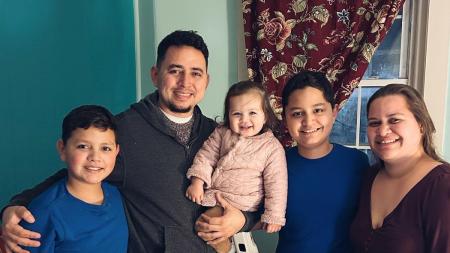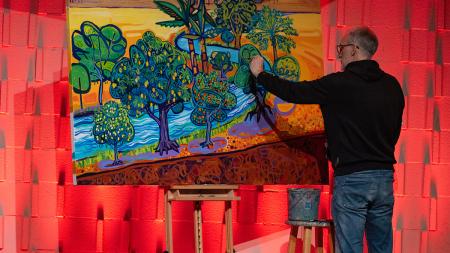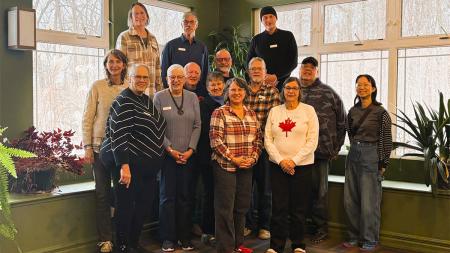Synod 2018 Talks About Justice

Dena Nicolai is a delegate to Synod 2018 and also a member of the Committee for Contact with the Government, a Canadian entity that provides oversight to the Centre for Public Dialogue.
Karen Huttenga
Three requests to Synod 2018 had to do with justice and the church’s role in political engagement. Delegates spent much time in prayer and deliberation about how to respond. In the end, they found a solution that includes a new U.S oversight committee and a commitment to pray for growth and wisdom as the church deals with these matters.
Shawn Brix, Classis Quinte, who introduced the discussion to the synod floor, framed it by saying, “Some of the material we’re addressing has to do with process. . . but much of it also has to do with broken relationships, relationships between our mercy and justice staff and those who disagree with some of their content or approach. Some of these relationships are stretched, strained, even broken in some instances.”
He noted that it is hard to be pastoral in a setting like synod with its 200 participants and formal rules. It is also hard to engage in this topic on social media. Much of the language online has been negative, even inflammatory and hurtful, he said.
“Today,” he said, “we want to turn a corner, to find a new way of dialoguing that begins with listening, listening to those who differ from us and learning from them.”
Brix concluded his opening speech by saying, “I’m going to declare that it’s out of bounds for anyone to leave this dialogue today declaring a winner. If that happens, we’ve all lost.”
And it seemed that in the end, everyone won.
The issue of how the church should engage politically was raised by three classes (regional assemblies of churches), Minnkota, B.C. South-East, and Columbia.
Minnkota cited examples of actions by CRC staff and the Office of Social Justice (OSJ), that it said exceeded their mandate, such things as denominational leaders signing on to the Evangelical Climate Initiative Statement and the OSJ posting an action alert advocating funding for Medicaid to continue the support of family planning.
Minnkota’s overture said, “We believe that engaging in this kind of activity goes beyond demonstrably biblical proclamation and embraces a particular political philosophy or strategy.” The classis requested synod “to instruct all agencies of the CRCNA to take up ecclesiastical matters only and to refrain from political advocacy.”
Classis Columbia took a different tack. They distinguished between lobbying, which they defined as asking for a specific action, and advocacy, by which they meant the expression of principles. They wanted agencies like the OSJ to be barred from lobbying the government on specific legislation or asking members of the church to do so.
Classis B.C. South-East, on the other hand, emphasized the importance of education. That classis wanted agencies like the OSJ to make greater efforts to educate the church in biblical and justice matters.
During the discussion, Synod delegates agreed that it is important for the church to continue to engage the social, political, and economic layers of public life. They affirmed that the church should continue to pray for justice and mercy, for the CRC as it speaks the gospel to the nations, and for growth in wisdom with respect to these matters.
Wayne Coleman, Classis Thornapple, wanted more, not less advocacy. Calling on the experience of the Black church in the US, and especially Dr. Martin Luther King, he said, “When I read these overtures [from Classes Minnkota and Columbia], I was deeply troubled. If it wasn’t for advocacy, where would we be? We are called to advocate for people who need it.” He said that the greatest advocate “was Jesus Christ, our Lord, who advocated for us when we did not deserve it.”
For Gary Duthler, Classis Alberta North, speaking together to the powers of our time express “the heart of the Christian Reformed Church.” He said that we live in an age of individualism and against that individualism the CRC has held to the idea that we are in covenant with God and each other.
It was by creating a U.S. committee to provide guidance and support for OSJ that got to the heart of the issues. The model for this new committee is the Canadian Committee for Contact with the Government (CCG). This committee, now 50 years old, provides guidance and support for the Centre for Public Dialogue, a Christian Reformed ministry that works “to promote the flourishing of all people through constructive dialogue and advocacy in Canada.”
In the Canadian context, this arrangement has worked well. The idea is that the new U.S. committee would provide for the OSJ the same structure and counsel as the CCG provides for CPD. Delegates asked how committee members are selected and how it works. To respond, the CRC Canadian Ministries Director, Darren Roorda, and Mike Hogeterp, director of the Centre for Public Dialogue, were given the chance to speak. They explained what the Centre for Public Dialogue is and how it is supported and overseen by the Committee.
Both spoke to the positive working relationship between these two entities. Hogeterp cited how the committee includes a variety of opinions that help him understand issues from regional perspectives. Several past and current committee members were in attendance at synod and were commended for their work in this area.
Ben Boersma, a young adult representative, said that the proposal to start a similar U.S. committee “seemed like good middle ground.”
Delegates were also happy with the plan, which promised to both temper the OSJ and protect it from unfair criticism.
Tom Bomhof praised the committee that had brought the proposal. He said, “We tend to be shrill, entrenched in and tied to our views.” He added, “We are Christians first, and members of political parties second.”
As a next step, synod asked that the justice and mercy ministries connect theological reflection with political advocacy, fostering discussion and education based on biblical principles for public discipleship, and that, in the case of calls for action, these ministries “provide rationale that is biblical, theologically Reformed, and grounded in . . . denominational positions. . ..”
Some time was spent discussing whether to include an instruction to the OSJ and other justice ministries to present alternative political stances when issuing a call for action. Synod rejected this idea with several delegates saying that it was impractical.
In a remarkable show of unity and good spirit, synod applauded the officers of the committee that had formulated the recommendations, reporter Shawn Brix of Classis Quinte, and chair Brian Kuyper of Classis Alberta South/Saskatchewan.
Synod delegates had entered the discussion with what seemed to be trepidation, afraid that the deep divisions in society would explode into a difficult and divisive debate in the church. It emerged from the discussion with a sense of new possibilities for dialogue and unity.
Perhaps it was summed up by Darrell Delaney, Classis Grand Rapids East, who said, “The essence of justice is the restoration of shalom [peace]. God’s shalom is for all the world because the earth is the Lord’s and the fullness thereof,”
On what could have been a divisive issue, it seemed that synod had found shalom.
For continuous coverage of Synod 2018 including the live webcast, news, video recordings, photos, reports, liveblog, social media links, and more visit www.crcna.org/synod.


